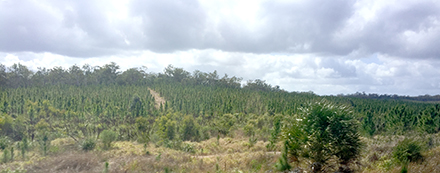Queensland’s forest and timber industry is looking forward to the lifting of the water rule barrier in the Emissions Reduction Fund (ERF) to promote new plantation investment in the state. Source: Timberbiz
Timber Queensland CEO Mick Stephens said that this barrier is irrational and discriminatory against new plantation investment in Queensland.
“Under the ERF scheme, plantation forestry is the only land-based carbon sequestration activity subject to this perverse rule. This rule blocks any new plantations from participating in the scheme in areas that receive over 600mm annual rainfall. The only exception is where the federal Ministerial has provided separate approval which has not been granted for Queensland,” Mr Stephens said.
“This rule is outrageous given recent integrity issues raised with some other land-based sequestration activities in the ERF scheme. Plantation forestry is one of the most robust and easily measurable activities for achieving carbon sequestration, while also providing co-benefits of additional timber supply to meet our housing and construction needs,” he said.
While the rule remains in place, the plantation area in Queensland has gone backwards and has fallen by over 7% over the past few years.
“Hence the industry is looking forward to the Albanese Government implementing their commitment to remove the water rule and promote new plantations to meet the nation’s needs”.
Under their pre-election policy commitment for the forest products industry in 2022, the ALP stated:
Labor reiterates its policy of removing the water rule in relation to the Emissions Reduction Fund and carbon farming.
“It’s time to get this done, as this rule has further blocked access to the Queensland Government’s Land Restoration Fund since its inception for plantation forestry. It is counterproductive for both farmers and the state government’s goal to promote land-based sequestration with co-benefits,” Mr Stephens said.
“The lifting of this barrier will help drive much needed new plantation investment by allowing farmers and landowners to bid and earn carbon credits in relevant schemes. With the rule removed, we see large potential for farmers to integrate planted forests with beef grazing, for example, to diversify their incomes and generate carbon and agricultural productivity benefits,” Mr Stephens said.






